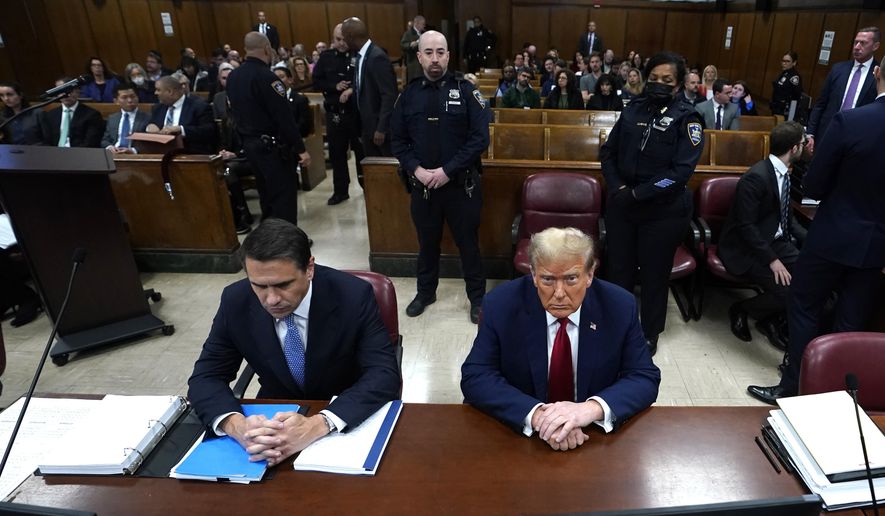If former President Donald Trump is convicted in his hush money trial in New York, it would likely be overturned on appeal, according to legal experts.
But analysts say the political damage may have already been inflicted on the former president by Manhattan District Attorney Alvin Bragg and Judge Juan Manuel Merchan, who have both expressed criticism of the defendant in the early stages of the trial.
“It is obvious this is a selective and vindictive prosecution by Bragg, who sat on it for six years and then indicted just in time for a trial before the November election. And Judge Merchan is a willing participant in this raw use of the law for political purposes,” said Joseph Moreno, a former federal prosecutor.
“But while the likelihood of a conviction being overturned on appeal is high, the fact is the trial will accomplish what Bragg and his fellow Democrats want — to keep Trump off the campaign trail and hopefully label him a convicted felon just in time for the election,” he said.
Mr. Trump has a very slight lead in polls over President Biden, according to the RealClear Politics average.
But a Reuters/Ipsos poll released earlier this month shows that 13% of voters who back Mr. Trump would not support him if he is convicted of a felony. Given the tightness of the race, that loss of support easily could make the difference.
The former president is facing four criminal prosecutions from New York to Florida.
The New York hush money trial — the first of the criminal trials to begin with the others lacking a firm start date — has a political taint to it aside from the notoriety of the defendant, with reports that Judge Merchan donated to his political foe, Mr. Biden, yet declined to recuse himself from overseeing the prosecution of Mr. Trump.
Additionally, a New York law requires that a judge must recuse if someone within the sixth degree of relation has an interest in the proceeding. According to reports, Judge Merchan’s daughter works for a marketing firm that has Democratic clients who have fundraised millions off the trial.
Nevertheless, the judge has decided to stay on the case.
And he has continued to enforce a gag order against the former president that restricts Mr. Trump from making comments about witnesses.
Critics of the judge, though, note that controversial witnesses such as adult film actress Stormy Daniels, whose real name is Stephanie Clifford, and Mr. Trump’s former attorney — turned felon — Michael Cohen, have been able to speak to the public and take jabs at the former president.
“This gag order is clearly unconstitutional. Gag orders are supposed to protect criminal defendants — not gag them — and if a defendant threatens the judge or a witness, they can be charged with obstruction of justice or witness tampering,” said Mike Davis, president of the Article III Project and a former clerk to Justice Neil M. Gorsuch.
“Judge Merchan rigged the jury selection process to weed out Trump supporters while keeping Biden supporters,” Mr. Davis added. “One of the questions on the questionnaire was whether these potential jurors followed Trump on social media, but they didn’t ask whether the potential jurors follow Biden on social media.”
If there’s a guilty verdict, the potential conflicts over recusal and silencing the defendant could present a problem on appeal, as a defendant is supposed to be guaranteed a trial free from even the appearance of impropriety or partiality.
“This is clearly a biased judge who is railroading Trump before the election, and after the election they don’t care if he gets reversed,” Mr. Davis said.
Mr. Moreno, meanwhile, says those issues present concerns over conflicts of interest, but they are not why he foresees a potential conviction being tossed.
In his view, a conviction would not stick to Mr. Trump due to Mr. Bragg lacking the authority to enforce federal elections law.
“If Bragg manages to secure a conviction of Trump on any of the felony charges, there is a high likelihood the case will be overturned on appeal,” Mr. Moreno said. “Bragg’s characterization of this as an ‘election interference’ case reveals what we knew all along - that he is trying to tie his misdemeanor state books and records to federal campaign finance laws. The problem for Bragg is that, as a local prosecutor, he has no power to enforce federal laws.”
“There is also the problem that hush money payments — while sordid — do not constitute campaign contributions. That is likely why the Justice Department and the Federal Election Commission both looked at this case and passed on it,” he said.
Mr. Bragg charged Mr. Trump with 34 felony counts of falsifying business records, alleging the former president disguised payments to his former attorney Mr. Cohen in connection to a nondisclosure agreement that paid Stormy Daniels $130,000 to silence her because she alleged the two had an affair.
Mr. Trump has denied any relations with Ms. Daniels.
The prosecution charges that the former president erred in classifying the reimbursement of the $130,000 to Mr. Cohen as legal fees. Prosecutors say the hush money was an attempt to influence the 2016 election in order to keep the story from surfacing as voters went to the polls.
The trial has made history as the first time that a former president has been a criminal defendant in a courtroom.
Mr. Bragg has defended the prosecution of Mr. Trump, saying it’s another example of white-collar crime.
“Someone lied again and again to protect their interests and evade the laws to which we are all held accountable,” Mr. Bragg has said.
• Alex Swoyer can be reached at aswoyer@washingtontimes.com.




Please read our comment policy before commenting.